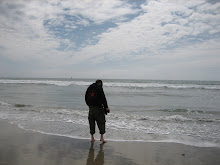Love is my true identity. Selflessness is my true self. Love is my true character. Love is my name.
If, therefore, I do anything or think anything or say anything or know anything that is not purely for the love of God, it cannot give me peace, or rest, or fulfillment, or joy.
To find love I must enter into the sanctuary where it is hidden, which is the mystery of God. And to enter into His sanctuary I must become holy as He is holy, perfect as He is perfect.
How can I even dare to entertain such a thought? Is it not madness? It is certainly madness if I think I know what the holiness and perfection of God really are in themselves and if I think that there is some way in which I can apply myself to imitating them. I must begin, then, by realizing that the holiness of God is something that is to me, and to all me, utterly mysterious, inscrutable behond the highest notion of any kind of perfection, beyond any relevant human statement whatever.
If I am to be "holy" I must therefore be something that I do not understand, something mysterious and hidden, something apparently self-contradictory; for God, in Christ, "emptied himself." He became a man, and dwelt among sinners. He was considered a sinner. He was put to death as a blasphemer, as one who at least implicitly denied God as one who revolted against the holiness of God. Indeed, the great question in the trial of and condemnation of Christ was precisely the denial of God and the denial of His holiness. So God Himself was put to death on the cross because He did not measure up to man's conception of His Holiness... He was not holy enough, He was not holy in the righ way, He was not hoy in the way they had been led to expect. Therefore, he was not God at all. And, indeed, He was abandoned and forsaken even by Himself. It was as if the Father had denied the Son, as if the Divine Power and mercy had utterly failed.
In dying on the Cross, Christ manifested the holiness of God in apparent contradiction with itself. But in reality this manifestation was the complete denial and rejection of all human ideas of holiness and perfection. The wisdom of God bacame folly to men, His power manifested itself as wekness, and His holiness was, in their eyes, unholy. But Scripture says that "what is great in the eyes of men is an abomination in the sight of God," and again, "my thoughts are not your thoughts," says God to men.
If, then we want to seek some way of being holy, we must first of all renounce our own way and our own wisdom. We must "empty ourselves" as He did. We must "deny ourselves" and in some sense make ourselves "nothing" in order that we may llive not so much in ourselves as in Him. We must live by a power and a light that seem not to be there. We must live by the strength of an apparent emptiness that is always truly empty and yet never fails to support us at every moment. This is holiness.
None of this can be achieved by any effort of my own, by any striving of my own, by any competition with other men. It means leaving all the ways that men can follow or understand.
I who am without love cannot become love unless Love identifies me with Himself. But if He send His own Love, Himself, to act and love in me and in all that I do, then I shall be transformed, I shall discover who I am and shall possess my true identity by losing myself in Him.
And that is what is call sanctity.
~ Thomas Merton

No comments:
Post a Comment